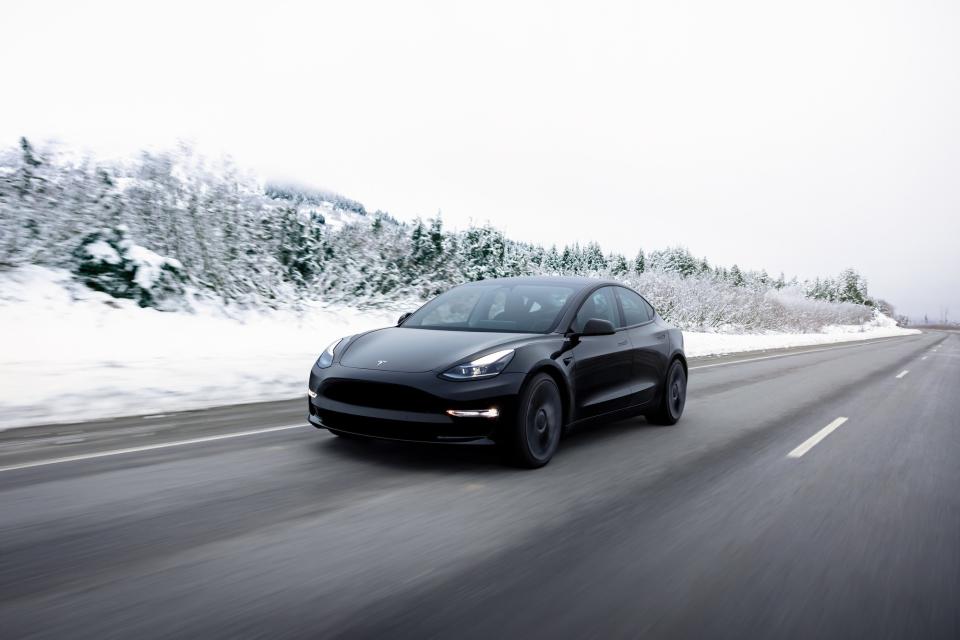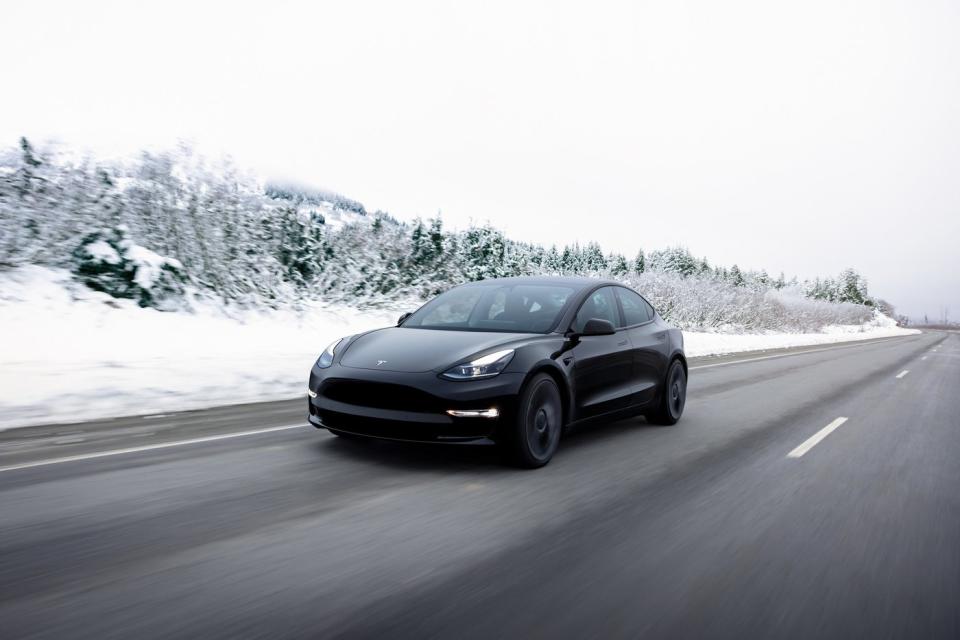Tesla Makes Money Selling Electric Vehicles, But 67% of Its Earnings Might Soon Come From This Instead

Tesla (NASDAQ: TSLA) sells more passenger electric vehicles (EVs) than any other car maker, and they account for 84% of the company's revenue today.
However, seasoned technology investor Cathie Wood thinks Tesla stock is the biggest artificial intelligence (AI) opportunity in the world. The company is using AI to develop its industry-leading autonomous self-driving vehicle software.
Wood's investment firm, Ark Investment Management, released a set of financial models that suggest electric vehicle sales won't be the primary source of Tesla's financial success for much longer. With the help of AI, 67% of the company's earnings will come from something else entirely by 2027! Here's what investors need to know.
Here's what Tesla's business looks like today
Tesla is on track to produce 1.8 million EVs in 2023, a number that CEO Elon Musk hopes will grow by 50% per year for the foreseeable future. The company operates six gigafactories located in California, Texas, Nevada, New York, Berlin (Germany), and Shanghai (China), with another in the planning stages in Nuevo Leon (Mexico).
But Tesla will have to expand its footprint if it wants to maintain Musk's desired growth rate over the long term. He estimates the company will be operating up to 12 gigafactories around the world by 2030, with a production capacity of 20 million EVs per year.
Reaching that point won't be easy, because competition is growing fast from start-ups and legacy automakers entering the EV space. Tesla has a significant head start, and it enjoys economies of scale -- its gross profit margin is higher than that of any other car maker in the industry, which affords the company pricing power to help fend off competitive threats.
In fact, Tesla slashed the prices of its EVs by an average of 20% between August 2022 and August 2023. Car giants like General Motors and Ford have already announced plans to postpone billions of dollars in investments into their own EV businesses, as they realize they will have to sustain heavy losses to compete with Tesla in the near term. Right now, Ford loses about $36,000 on every EV it produces!
But Tesla's price war is a huge drag on its own financials. While the company is on track to sell a record number of cars, its 2023 revenue is projected to grow by just 19% year over year -- the slowest annual pace in its history. The EV giant's earnings per share (profit) is set to shrink by 22%.
Tesla is tackling a new frontier
Tesla has been developing its full self-driving (FSD) software for over 10 years. It's currently the most advanced in the industry; Musk says Tesla customers have driven over 300 million miles using the beta version so far, and data is king when developing any AI-based technology.
Ark Invest also estimates Tesla has 2.7 million customer cars on the road testing FSD, which is 10 times more than its nearest competitor.
Musk has told investors Tesla plans to launch a fully autonomous robotaxi -- with no pedals or steering wheel -- by 2024, which can seamlessly transport passengers with no human assistance. However, once FSD rolls out to all customers, any Tesla vehicle could become a robotaxi.
Musk says the average passenger vehicle is only driven for 12 hours per week, so customers could lend their Tesla EVs to the company's ride-hailing network when they're not in use. That would allow the owner to earn income, which would be split with Tesla.

The robotaxi could transform Tesla's economics
Given the robotaxi hasn't launched yet, it's hard to say exactly what the business model will look like. However, we know Tesla will earn recurring subscription revenue from customers who install FSD software, and we also know Musk is considering licensing it to other car makers.
Of course, sales of the robotaxi itself will drive revenue, and any customer-owned Tesla serving as a robotaxi in the company's ride-hailing network will also contribute revenue.
By 2027, Ark Invest believes Tesla will be generating over $1 trillion in annual revenue, with 44% coming from the robotaxi business. That will translate into $354 billion in earnings before interest, tax, depreciation, and amortization (EBITDA), of which 64% will come from robotaxis and a further 3% from human-driven ride-hailing within Tesla's network.
Assuming Ark is correct, that means 67% of Tesla's 2027 EBITDA will come from segments that don't even exist today.
Ark's forecasts might be too ambitious
Tesla's revenue is on track to come in at $97 billion in 2023, so it would have to grow by 80% per year between now and 2027 to meet Ark's $1 trillion forecast by 2027. Keep in mind, Musk himself is only aiming for 50% EV production growth going forward.
The big unknown is how quickly Tesla can scale its robotaxi and ride-hailing businesses. Uber Technologies has 142 million monthly customers on its ride-hailing platform, and that company is on track to generate just $37 billion in revenue this year. Plus, Uber recently launched a fully autonomous service in Arizona in partnership with Alphabet's Waymo, so Tesla already faces competition.
I wouldn't place a sizable bet on Tesla stock based solely on Ark's financial models. They might prove accurate over time, but 2027 is an incredibly ambitious target.
Nevertheless, if and when Ark's predictions come true, Tesla could amass a valuation of over $6 trillion! That implies a 770% upside in its stock from where it trades today.
Where to invest $1,000 right now
When our analyst team has a stock tip, it can pay to listen. After all, the newsletter they have run for two decades, Motley Fool Stock Advisor, has more than tripled the market.*
They just revealed what they believe are the ten best stocks for investors to buy right now... and Tesla made the list -- but there are 9 other stocks you may be overlooking.
*Stock Advisor returns as of December 18, 2023
Suzanne Frey, an executive at Alphabet, is a member of The Motley Fool’s board of directors. Anthony Di Pizio has no position in any of the stocks mentioned. The Motley Fool has positions in and recommends Alphabet, Tesla, and Uber Technologies. The Motley Fool recommends General Motors and recommends the following options: long January 2025 $25 calls on General Motors. The Motley Fool has a disclosure policy.
Tesla Makes Money Selling Electric Vehicles, But 67% of Its Earnings Might Soon Come From This Instead was originally published by The Motley Fool
